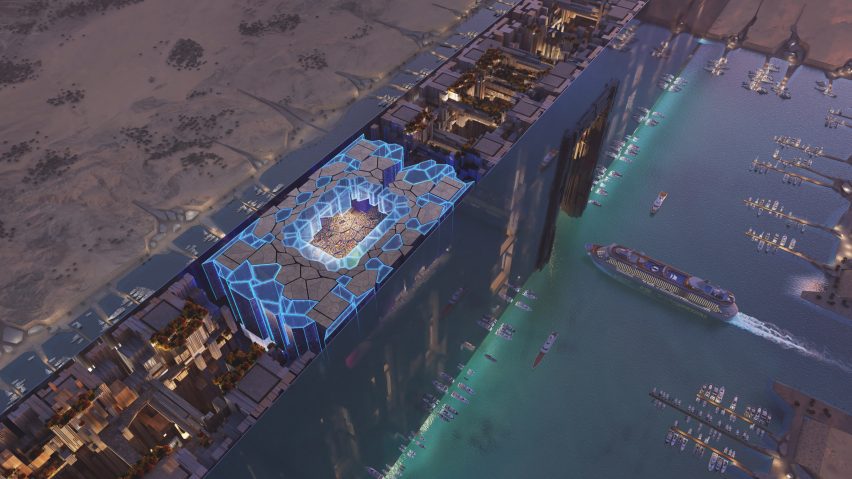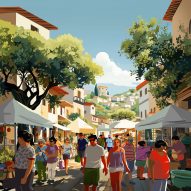Cities and structure the world over are more and more being influenced by the essentially anti-democratic rules of locations like Dubai, argues educational Quinn Slobodian on this interview.
Slobodian is a Canadian historian primarily based at Boston College. His 2023 guide Crack-Up Capitalism: Market Radicals and the Dream of a World With out Democracy charts the rise of particular financial zones – areas with deregulated commerce legal guidelines designed to draw funding.
These zones have proliferated for the reason that Nineteen Eighties, with greater than 5,400 the world over right now. Examples embody Shenzhen, Singapore, Hong Kong and Jebel Ali Free Zone in Dubai.
“Smoothing out” of structure
Typically, they’re related to a selected style of assertion structure, which Slobodian believes is especially geared toward grabbing the eye of potential buyers.
“You bait the hook with these huge status initiatives for extra infrastructural initiatives,” he advised Dezeen.
An instance is the flurry of improvement that adopted the completion of the Burj Khalifa in Dubai in 2010 – nonetheless the world’s tallest skyscraper.
However the phenomenon might be traced again to the earliest particular financial zones, he mentioned, and might be seen right now in “blank-slate city experiments” resembling Neom in Saudi Arabia.
Preliminary initiatives have been characterised by cutting-edge structure in high-tech and parametric kinds, typified by buildings resembling Foster + Companions’ HSBC Foremost Constructing in Hong Kong, accomplished in 1986.
Nevertheless, Slobodian argues that the initiatives have turn into much less experimental over time, and predicts that such buildings will proceed to get extra homogenous.
“There will likely be a smoothing out, truly, of any makes an attempt at adventurous constructing or types of cohabitation, as a result of they’re extra dangerous than is critical,” he mentioned.
As an alternative, structure in cities influenced by particular financial zones is more and more characterised by the prioritisation of privateness and safety and a detachment from native tradition, Slobodian claims.
“In the event you take the gated communities as a prototype, what you truly get is like radical conformity and homogeneity throughout areas,” he mentioned.
“Why? As a result of they’re all designed for individuals with insurance coverage firms and funding in safety primarily in thoughts, so you’ll be able to’t deviate from the identical boilerplate set of phrases and situations.”
Cruise-ship urbanism
Slobodian predicts that future cities constructed within the mould of particular financial zones, resembling The Line in Saudi Arabia, may perform like cruise ships.
“There could be checkpoints getting into this personal metropolis, which might filter out individuals who they might need and would not need, on the mannequin of the cruise ship or the theme park, that are different favourite prototypes for these libertarians and personal metropolis boosters,” he steered.
Although he paints zone cities as dystopian manifestations of “capitalism with out democracy”, Slobodian warns that they can’t be written off as fringe experiments.
“These microstates and city-states resembling Singapore and Dubai have turn into not exceptions throughout the world economic system, however templates for a way the entire panorama of the world economic system could also be reconfigured,” he mentioned.

“What frightens me is the personal metropolis, the gated group that seeks to implement Dubai-like situations on the present natural complexity of cities and produce onerous obstacles of exclusion and inclusion primarily based on superior financial utility,” he added.
“Imagining that now at scale is kind of terrifying. The unhappy fact is persons are prepared to surrender a few of their freedoms for safety.”
Indicators of anti-democratic urbanism are already spreading in Western cities, argues Slobodian.
“There’s the Hudson Yards impact, the place you stroll into it, and immediately really feel such as you stroll via a portal into a special metropolis and it is principally uninhabited,” he mentioned.
Donald Trump’s political ascendency in the US, given his background as a property developer, has solely elevated the ability of crack-up capitalism, in accordance with Slobodian.

Silicon Valley buyers unveil controversial idea for brand new metropolis in California
“He sees himself as a real-estate one that has a slew of unimaginable pictures of himself holding copper moulds of the constructing or no matter, and who has been making the most of these practices of zoning for the reason that Nineteen Eighties on the newest,” Slobodian mentioned.
He factors to Trump administration’s Freedom Cities plan – a proposal for as much as 10 new deregulated cities on federal land within the US that’s reportedly enthusiastically supported by a number of billionaires.
However, Slobodian stays hopeful that extra equitable urbanism may make a comeback – pointing to Berlin and Montreal within the Nineteen Nineties, which have been thought-about by buyers on the time to be in a state of decline.
“Rents collapse, casual economies thrive, and public order is corroded via types of subcultural recreation,” he mentioned.
“These are the cities that I’ve felt the strongest love for in my life.”
Dezeen In Depth
In the event you get pleasure from studying Dezeen’s interviews, opinions and options, subscribe to Dezeen In Depth. Despatched on the final Friday of every month, this article supplies a single place to learn in regards to the design and structure tales behind the headlines.
















